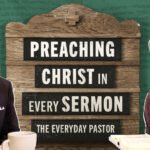Apologetics books tend to focus on rational arguments for God’s existence and the truth of Christianity. Such books are useful (and we should certainly reject irrational arguments!). But in this cultural moment, objections to Christianity tend to begin further upstream. Many skeptics aren’t fixated on whether our faith is true; they doubt that it’s even good. No longer does Christian belief look merely implausible. It looks immoral.
Gavin Ortlund—pastor and host of the YouTube channel Truth Unites—wants to address skeptics from a fresh angle. In his new book Why God Makes Sense in a World That Doesn’t: The Beauty of Christian Theism (Baker Academic) [Gospelbound interview | 20 quotes], Ortlund proposes a big claim: supernaturalism, and Christian theism in particular, is “more plausible, more elegant, more dignifying to humanity, and more hopeful” than naturalism. It makes the best sense of our biggest questions and our lived experience. Ortlund draws from unlikely sources—for example, math and music [short talk]—to show that the Christian worldview is indeed beautiful and resonates, at the deepest level, with how we are wired to experience the world.
I asked Ortlund about his unique approach, why he respects nihilists like Nietzsche more than newer atheists like Sam Harris, why “certainty” is not necessary, and more.
“The needs of the times,” you feel, “call for a slightly different approach to apologetics” (xii). What do you mean?
First, we live in a time when many people have lost a sense of hope. There is much disintegration, disillusionment, disenchantment, and despair. Second, we live in a time of hurriedness and distraction—the greatest opponent to apologetics is usually not argumentation, but apathy. Third, we live in a time of outrage and polarization. So, criticism of religion often focuses on whether it is good more than whether it is true.
I think that our approach to apologetics must take these realities into account. We must articulate the gospel in relation to all three transcendentals—the good, the true, and the beautiful. This classical approach to apologetics has deep theological roots. But it’s also more likely right now to gain a hearing and touch the deepest concerns of our non-Christian friends and neighbors.
So, my book utilizes four classical arguments, but I weave them into a narrative frame and draw attention to their implications for goodness and beauty. I am proposing that Christianity is a more plausible story than naturalism—but also, that it’s just an all-around better story.
You suggest that the way we experience reality is a clue, not an illusion. Why does this distinction have explanatory power?
Throughout the book I draw attention to various aspects of the human experience that seem to evoke transcendence and a sense of deeper meaning—for example, our enjoyment of music, or our experience of love. For a naturalistic worldview, feelings of significance associated with music and love are ultimately illusory. They are simply a spinoff of the evolutionary process—unintentional byproducts of adaptive mechanisms that evolved for other reasons. With a theistic worldview, by contrast, we are enabled to experience the sense of transcendence in music or love as a clue about what is ultimately beyond the world.
The metaphor I use is this: on naturalism, the human perception of transcendence in music or love is like an opiate to a dying person—it’s pleasant because it distracts us from reality. On theism, the human perception of transcendence in music or love is like a window to an imprisoned person—it’s pleasant because it points us to reality. The question is not merely which is more plausible (though it’s certainly that). It is also: which of these alternatives can you actually live with? (As you think about the answer, remember how you feel about the person in this world you love the most.)
C. S. Lewis’s classic trilemma—Jesus was either a liar, a lunatic, or the Lord—has enduring value, but many skeptics insist that Scripture’s exalted portrait of a divine Christ amounts to something else: a legend that developed over time. How would you respond?
It’s important to emend Lewis’s brilliant argument to account for this fourth possibility (legend) because skeptics like Bart Ehrman argue that Jesus didn’t claim to be God. I make the case against this possibility in chapter 4. To briefly summarize, even if we allow for the most radical higher-critical approach to the Gospels, we still have numerous passages in which Jesus acts with divine authority. Examples include his healing the paralytic in Mark 2:10, or in his response to Caiaphus in Mark 14:62. The Pharisees knew what Jesus was saying in these passages. That’s why they accused him of blasphemy.
The historical evidence suggesting a divine account of the person of Christ is remarkably compelling.
Additionally, it’s worth pointing out that we have remarkably good evidence for the Gospels as historically reliable documents. They were written very close to the events they report, within the living memory of many who would have lived through them. Scholars like Richard Bauckham have drawn attention to the carefulness with which the stories of Jesus’s life were transmitted through oral tradition during those intervening decades. For example, these stories were often connected to particular named eyewitnesses. Further, the Gospels contain an enormous level of concrete detail, which would’ve been verifiable—or falsifiable!—at the time of their writing. Beyond that, the Gospels contain much that would’ve been embarrassing to the early Christian movement if not true (e.g., the disciples’ frequent ineptitude, or the fact that women are among the first eyewitnesses of the resurrection).
When I went into my research, I thought a better case could be made for God (from philosophy) than for Christ (from history). I’ve changed my mind. The historical evidence suggesting a divine account of the person of Christ is remarkably compelling.
You seem to have more intellectual respect for older, austere atheists—say, Nietzsche, Sartre, or the character Ivan (from The Brothers Karamazov)—than their upbeat, “optimistic” modern counterparts (say, Sam Harris). Why?
I think the older atheists were more honest in chasing down the implications of atheism to their logical conclusion. Newer atheists like Sam Harris want to value things like philanthropy. He tries to find an objective basis for this in science and rationality, but in my opinion confuses the epistemological basis for morality (how we know it) with its ontological basis (where it actually comes from). Philosophers like David Baggett have shown that, in a naturalistic worldview, it is very difficult to find an ontological basis for moral obligation. (Not moral feelings, but moral obligation.)
Philosophers like Nietzsche and Sartre (and Ivan Karamazov) saw this clearly, and articulated it honestly. I respect that.
Though you don’t deal extensively with “the problem of evil” in this book—how could a good God allow so much (apparently pointless) evil and suffering?—it remains a towering, visceral objection to Christian faith. I trust your approach changes with someone in the throes of pain, but how do you typically respond to a good-faith skeptic who raises this understandable objection?
I think there are a number of responses to the problem of evil that have value, such as the free-will defense and the greater-goods defense. Ultimately, I think the problem loses force because it presumes to know what an infinitely good God would do in a certain circumstance. How could we know that?
It’s difficult to have an objective standard of good and evil in a naturalistic worldview, which means that the problem of evil is a problem for all of us (believer and skeptic alike). In the book I put it like this: theism may not fully tell you why there is evil, but naturalism cannot even tell you that there is evil. After all, if there is no supranatural standard of goodness, why is evil really wrong and not simply unpleasant?
Theism may not fully tell you why there is evil, but naturalism cannot even tell you that there is evil.
While I don’t think the problem of evil is ultimately a defeater for faith, it’s also not something to be lightly dismissed. We should always speak with compassion to the real suffering of those around us, and often the best response is not an argument but a hug.
Near the end you draw a distinction between certainty and probability. Why do you encourage doubters not to overrate the former—or underrate the latter?
We make many decisions in life on the basis of probability. I believe that probability, especially a high degree of probability, is often enough to get someone to a point of really considering the claims of Christianity. Often at that point the Holy Spirit takes over. There may even be times when trying to get to certainty can do damage, because it can tempt you to overstate your case.
In the conclusion of the book I argue (from Blaise Pascal and Søren Kierkegaard) that our uncertainty actually plays a role in the psychology of faith. In other words, if we had total certainty in every way, it might actually be counterproductive for what God wants to do in us.
If the Christian claim is true, then a battle is raging in the deep regions of our hearts, where we do business with God. We will not be held accountable for what we don’t know, but for making the best decision we can based on what we do know. So if someone finds Christianity to be probable because of the evidence, but is struggling because of a lack of certainty, my advice is this: ask God to reveal himself to you. Then keep your eyes peeled, and keep an open mind. I suspect you will not be waiting long. He has a way of getting through to us.
Involved in Women’s Ministry? Add This to Your Discipleship Tool Kit.
 We need one another. Yet we don’t always know how to develop deep relationships to help us grow in the Christian life. Younger believers benefit from the guidance and wisdom of more mature saints as their faith deepens. But too often, potential mentors lack clarity and training on how to engage in discipling those they can influence.
We need one another. Yet we don’t always know how to develop deep relationships to help us grow in the Christian life. Younger believers benefit from the guidance and wisdom of more mature saints as their faith deepens. But too often, potential mentors lack clarity and training on how to engage in discipling those they can influence.
Whether you’re longing to find a spiritual mentor or hoping to serve as a guide for someone else, we have a FREE resource to encourage and equip you. In Growing Together: Taking Mentoring Beyond Small Talk and Prayer Requests, Melissa Kruger, TGC’s vice president of discipleship programming, offers encouraging lessons to guide conversations that promote spiritual growth in both the mentee and mentor.






































